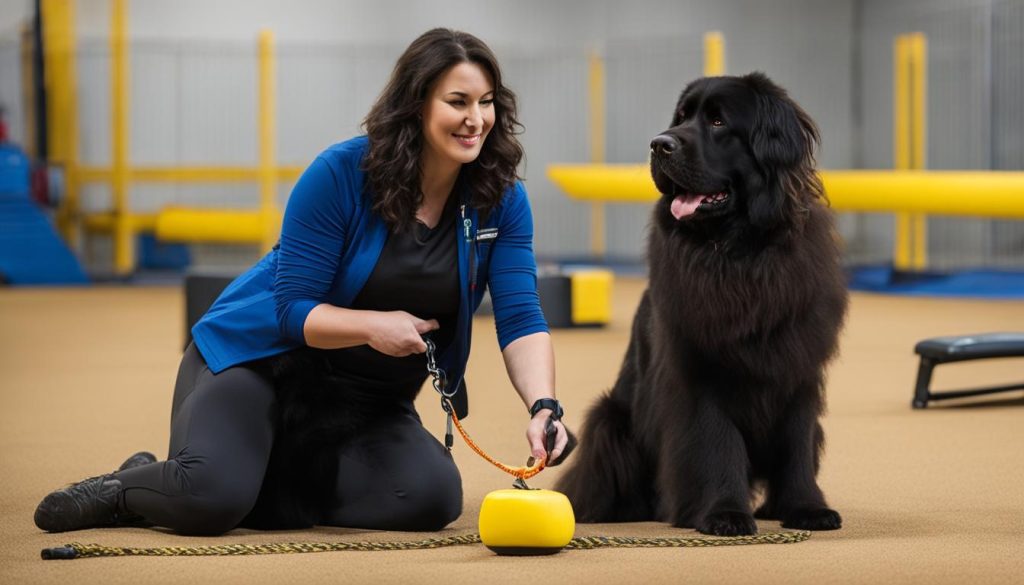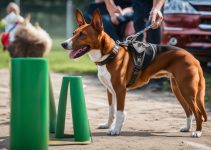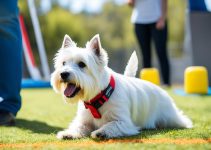Training a Newfoundland dog can be overwhelming, but with the right approach, you can successfully train your gentle giant. Newfoundland dogs are smart and need daily mental stimulation to prevent them from getting into trouble. It’s important to understand the breed and their unique characteristics, as well as the importance of positive reinforcement. Consistency, positive reinforcement, and understanding your Newfoundland’s individual personality are key to successful training.
Uncover Newfoundland Training
- Understanding the breed’s characteristics and needs is essential for successful Newfoundland training.
- Consistency and positive reinforcement are crucial for effective training.
- Training sessions should be tailored to your Newfoundland’s individual needs and learning style.
- Maintaining a sense of humor throughout the training process can make it more enjoyable.
- Seeking guidance from experienced trainers can provide valuable insight and support.
Understanding the Newfoundland Breed
Newfoundlands are known for their intelligence and gentle demeanor. However, without proper training and stimulation, they can become bored and engage in undesirable behaviors. To ensure a well-behaved and happy Newfoundland, it is essential to provide obedience training, puppy training, and behavior training.
One of the key aspects of Newfoundland training is obedience. Teaching your Newfoundland to follow basic commands such as sit, stay, and come is crucial for their safety and the well-being of those around them. Obedience training helps establish a strong bond between you and your Newfoundland while improving their overall behavior and obedience.
Puppy training plays a vital role in shaping your Newfoundland’s behavior from a young age. Starting early with crate training, potty training, and socialization will set a solid foundation for their future development. By properly introducing them to various environments, people, and other animals, you can help prevent any potential behavioral issues and ensure they grow up to be well-rounded dogs.
Behavior training addresses any specific behavioral challenges your Newfoundland may face. Whether it’s teaching them how to walk calmly on a leash or preventing destructive chewing, behavior training focuses on shaping their actions and reactions in different situations. It helps your Newfoundland understand appropriate behavior and develop good habits.
It’s important to note that Newfoundlands respond best to gentle and positive reinforcement training methods. Harsh treatment or physical punishment can have a negative impact on their sensitive nature. By using positive reinforcement techniques such as rewards, treats, and praise, you can encourage their desired behaviors while building trust and strengthening your bond.
Understanding the unique characteristics and needs of the Newfoundland breed is crucial for successful training. Their intelligence, strength, and gentle nature require consistent and engaging training sessions to prevent boredom and promote good behavior. By incorporating obedience training, puppy training, and behavior training into your routine, you can ensure a well-behaved and happy Newfoundland.
Taking Responsibility for Training Your Newfoundland
As a Newfoundland owner, it is your responsibility to train your dog. While professional trainers and resources can help guide you, the ultimate responsibility lies with you.
Consistency is key when it comes to training your Newfoundland. It’s important to establish a training routine and stick to it, ensuring that all family members are on the same page with commands and cues. This will help create a structured environment for your dog to learn and thrive.
When selecting a training method, consider what works best for you and your Newfoundland. Every dog is unique, and what may work for one may not work for another. Experiment with different techniques and approaches to find the ones that resonate with your dog the most.
While seeking guidance from professional trainers who specialize in Newfoundland training can be helpful, remember that you are the one who will be implementing the training techniques on a daily basis. Take the time to educate yourself on the best Newfoundland training methods and become familiar with the expertise of experienced trainers.

Incorporating the expertise of professional trainers can provide valuable insights and guidance, but in the end, it is your dedication and commitment that will ensure your Newfoundland’s success. By taking responsibility for your dog’s training, you can develop a strong bond and create a well-behaved companion.
The Importance of Consistency and Positivity in Training
Consistency is crucial when it comes to Newfoundland training. By establishing a training routine and sticking to it, you are setting the foundation for success. It’s important to ensure that all family members are on the same page with commands and cues, as this helps avoid confusion for your dog. Consistency also helps reinforce the desired behaviors and fosters a sense of security in your dog.
Positive reinforcement is one of the most effective methods for training Newfoundlands. They respond well to rewards and praise, so be sure to use these to your advantage. When your Newfoundland performs a behavior correctly, reward them with treats, affection, or verbal praise. This positive feedback motivates them to continue behaving in a desirable manner.
During training sessions, it’s crucial to keep the atmosphere positive and pressure-free. Newfoundlands are sensitive dogs, so any harsh or negative training methods can be counterproductive. Instead, focus on creating a nurturing and encouraging environment that encourages your dog to learn and succeed.
If you or your Newfoundland are losing patience or getting frustrated during training, it’s important to take a step back and regroup. Remember, training should be an enjoyable experience for both you and your dog. Taking breaks and practicing patience allows both of you to reset and approach the training session with a fresh mindset.
Effective Newfoundland Training Tips:
- Establish a consistent training routine and stick to it.
- Ensure all family members are consistent with commands and cues.
- Use positive reinforcement, such as treats and praise, to reward desired behaviors.
- Create a positive and pressure-free training atmosphere.
- Take breaks and regroup if patience is running low.
By implementing these best practices and maintaining a consistent and positive approach, you can effectively train your Newfoundland, setting them up for success and strengthening your bond along the way.
Breaking Down Training Sessions for Newfoundlands
When it comes to training your intelligent Newfoundland, it’s important to break down your sessions into manageable and effective chunks. Newfoundlands can lose focus quickly if training sessions are too long or repetitive. To ensure productive learning and prevent boredom, aim to keep each training session short, lasting around 5-10 minutes.
Before planning your training sessions, consider the age and attention span of your Newfoundland. Puppies may have shorter attention spans and may require even shorter training sessions. Tailor the length of the sessions based on your Newfoundland’s individual needs and abilities.
During each training session, focus on specific commands or behaviors that you want to reinforce. Working on one skill at a time will help your Newfoundland stay engaged and make progress more efficiently. Remember to use positive reinforcement techniques, such as treats and praise, to reward your dog for their achievements.
Introducing variety and fun into your training sessions can also keep your Newfoundland interested and motivated to learn. Incorporate different activities, such as retrieving objects or practicing tricks, to make the sessions enjoyable for both of you.
To maximize your training results, it’s important to adapt your training approach to your Newfoundland’s individual needs and learning style. Some Newfoundlands may respond better to visual cues, while others may rely more on verbal commands. Observe and understand your dog’s strengths and preferences to optimize the training experience.
By breaking down your Newfoundland training sessions, considering your Newfoundland’s attention span, tailoring your approach, and keeping things fun and engaging, you can successfully advance your Newfoundland’s training. Remember, consistency and patience are key when working with your intelligent and lovable Newfoundland.

Maintaining a Sense of Humor in Newfoundland Training
Training a Newfoundland can be challenging at times, but it’s important to maintain a sense of humor throughout the process. Newfoundlands are known for their goofiness, and incorporating playfulness into training can make it more enjoyable for both you and your dog.
When it comes to leash training, patience is key. Newfoundlands are strong dogs, so it’s important to start training them early on. Use positive reinforcement such as treats and praise to reward your dog for walking calmly on the leash. Remember, consistency is essential for effective leash training.
In addition to leash training, consider enrolling your Newfoundland in training classes. These classes provide a structured environment for learning and can help reinforce good behavior. They also offer the opportunity to socialize your dog with other dogs and people, which is important for a well-rounded and confident dog.
During the training process, it’s important to find what methods work best for your Newfoundland. Every dog is unique, so be patient and try different training techniques. Remember to keep the training sessions positive and fun, incorporating games and toys to keep your Newfoundland engaged and motivated.
Newfoundland training should be a positive and rewarding experience for both you and your dog. By maintaining a sense of humor, using effective training methods, and seeking professional guidance when needed, you can ensure that your Newfoundland becomes a well-behaved and happy companion.
Conclusion
Training a Newfoundland requires time, effort, and understanding, but the bond and well-behaved dog that result from successful training make it all worth it. Understanding the breed’s unique characteristics and taking responsibility for their training are essential steps toward success. Consistency and positivity, combined with breaking down training sessions and maintaining a sense of humor, create a positive learning environment for your Newfoundland.
By implementing these techniques, you can effectively train your Newfoundland and build a strong relationship based on trust and respect. Remember, training is an ongoing process that should continue throughout your dog’s life. Keep reinforcing the learned behaviors to ensure ongoing success and a happy, well-behaved Newfoundland.
So, if you’re ready to embark on the journey of Newfoundland training, be prepared to invest time and energy into their development. The rewarding experience of seeing your trained Newfoundland flourish will make it all worthwhile. With patience, dedication, and the right training approach, you can guide your Newfoundland towards becoming a well-trained companion and an integral part of your family.
FAQ
What are some effective training techniques for Newfoundland dogs?
Positive reinforcement is the most effective training method for Newfoundlands. Consistency, understanding the breed’s characteristics, and individualizing the training approach are also key.
How can I prevent destructive behavior in my Newfoundland?
Daily mental stimulation through training and activities can help prevent boredom and destructive behavior in Newfoundlands.
Do I need to seek professional help for training my Newfoundland?
While professional trainers can provide guidance, the ultimate responsibility lies with you as the owner. Seeking guidance from experienced trainers familiar with the breed can be helpful.
How long should training sessions be for Newfoundlands?
Training sessions should be kept short, around 5-10 minutes, to prevent loss of focus and ensure productive learning.
How can I incorporate playfulness into training my Newfoundland?
Newfoundlands are known for their goofiness, and incorporating playfulness into training can make it more enjoyable for both you and your dog.
Are training classes beneficial for Newfoundland dogs?
Enrolling your Newfoundland in training classes can help reinforce good behavior and provide a structured environment for learning.
Do I need to continue training my Newfoundland throughout its life?
Training is an ongoing process and should continue throughout your Newfoundland’s life to ensure ongoing success and a well-behaved dog.






